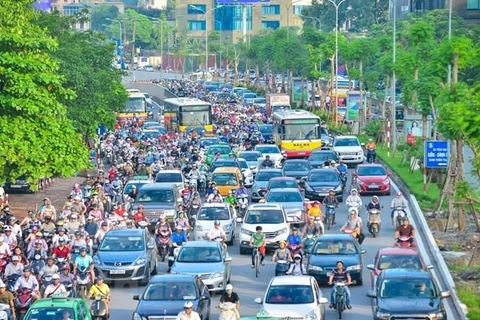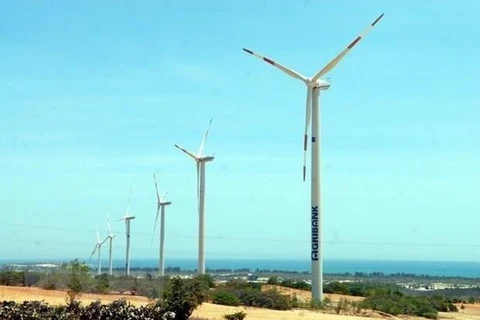 Local residents in Song An commune in Vu Thu district of northern Thai Binh province burn straw after harvesting (Photo: VNA)
Local residents in Song An commune in Vu Thu district of northern Thai Binh province burn straw after harvesting (Photo: VNA)
Hanoi (VNA) – Vietnam aims to cut its greenhouse gas (GHG) emissions by 9 percent by 2030 compared to the Business-As-Usual Scenario (BAU), equivalent to 83.9 million tonnes of CO2eq, using its domestic resources, according to the Department of Climate Change under the Ministry of Natural Resources and Environment (MoNRE).
Vietnam’s reduced GHG emissions can be increased to 27 percent (equivalent to 250.8 million tonnes of CO2eq) if the country receives international support through bilateral and multilateral cooperation and implementation of mechanisms under the Paris Agreement, it said.
Important contributions
On July 24, 2020, Prime Minister Nguyen Xuan Phuc approved an updated Nationally Determined Contribution (NDC) of Vietnam, which contributed to enhancing the country’s contributions to the global climate change mitigation.
The updated NDC identifies mitigation measures for the 2021-2030 period, and strategic adaptation tasks and measures to minimise damage caused by climate change that are specific to each sector.
Compared to the already submitted NDC, the contribution on mitigation in the updated NDC has significantly increased in terms of both reduced emissions volume (compared to BAU) and reduction percentage with Vietnam’s domestic resources. More specifically, the emissions reduction has increased by 21.2 million tCO2eq (from 62.7 million tonnes of CO2eq to 83.9 million tonnes of CO2eq), equal to an increase of emission reduction of 1 percent (from 8 percent to 9 percent).
The contributions of GHG emissions reduction with additional international assistance will increase from 25 percent to 27 percent and the GHG emissions reduction has increased by 52.6 million tonnes of CO2eq (from 198.2 million tonnes of CO2eq to 250.8 million tonnes of CO2eq).
The updated NDC has set strategic tasks on adaptation, including: enhancing adaptation efficiency through strengthening state management and resources for adaptation; increasing the resilience and adaptive capacity of communities, economic actors and ecological systems; mitigating disaster risks and damages, preparing to respond to increasing natural disasters and extreme climatic events due to climate change.
Given the socio-economic development of a developing country significantly affected by climate change, the updated NDC of Vietnam has reflected the country's highest effort in contributing to the global climate change response and implementation of the UNFCCC and the Paris Agreement.
In 2014, Vietnam's GHG emissions accounted for only about 0.5 percent of the total global GHG emissions with per capita emissions of only 2.84 tonnes of CO2eq.
Nevertheless, Vietnam has actively implemented activities in response to climate change, developing its economy towards low-carbon development and green growth, and promoting the implementation of potential mitigation measures in the energy, industry, transport, agriculture and waste sectors, as well as improving the carbon sequestration capacity in the land use, land-use change and forestry sector.
Chances for strengthening international cooperation
According to the Department of Climate Change, from 2021, Vietnam will be obliged to implement its NDC. Vietnam has adopted its Plan for Implementation of the Paris Agreement under the Prime Minister's Decision No. 2053/QD-TTg dated October 28, 2016 with 68 key task groups to be undertaken until 2030.
The implementation of its NDC is considered to be Vietnam’s key task of responding to climate change in the country in the new period, meeting actual requirements of domestic climate change response while fulfilling its responsibility of contributing to the international community’s efforts.
Implementing the updated NDC requires significant financial, technological and human resources. Measures to facilitate the implementation of the updated NDC include development and finalization of policies and institutions; communication, education, awareness raising; efficient development and application of resources.
State, enterprises and communities will be responsible for implementing Vietnam's updated NDC. The Ministry of Natural Resources and Environment will act as a focal point supporting the Government with the participation of ministries, sectors, local agencies and enterprises in accordance to their assigned functions and tasks.
Financial resources for the implementation of the updated NDC are mobilised from various channels in compliance with the State Budget Law, Public Investment Law, Investment Law, and other relevant legal documents. Mobilisation channels include the state budget (both central and local budgets), international supports, and contributions from the private sector and communities
Implementing its NDC, Vietnam will have more opportunities to promote international cooperation to respond to climate change. At the moment, many important international partners have shown their interest in and willing to support Vietnam in fulfilling its NDC, and there are programmes and projects supporting the climate change response in Vietnam in the very near future.
In order to facillitate the implementation of the updated NDC, the Ministry of Natural Resources and Environment is tasked to hold prime responsibility for coordinating with relevant ministries, agencies to develop the Support Programme to implement NDC for the period 2021-2030, and to update the national strategy on climate change for the period 2021-2025 which will include goals stated in the updated NDC and contents required in the Paris Agreement.
The Ministry of Natural Resources and Environment will submit the updated NDC to the UNFCCC Secretariat; assume the prime responsibility and coordinate with the ministries, sectors and international partners in organizing the implementation of NDC under the Prime Minister's approval./.
























